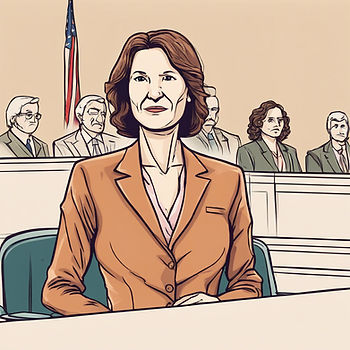Exploring Medical Ethics in Healthcare
What would they think of the ruling? Was justice served?
The final ethical concept I will connect my book to is the theme of justice. In my previous post, I argued that it could be considered unjust to allocate significant resources to patients who are unlikely to survive after an emergency. From this perspective, prioritizing resources for patients with a higher chance of survival would be the just decision. However, one could also argue that it is equally unjust to favor those deemed more likely to survive while neglecting patients in worse condition. From this viewpoint, all patients deserve an equal share of resources, regardless of their chances of recovery.
In this post, I will continue to explore the theme of justice, focusing specifically on the legal case that arose after Hurricane Katrina.
As I mentioned in my fourth blog post, Memorial Hospital came under investigation when it was revealed that it had the highest number of fatalities among local hospitals. Interviews with Lifecare staff and some permanent staff at Memorial revealed allegations that Dr. Pou had made the decision to administer lethal injections to certain patients. These claims were supported by evidence uncovered during the investigation, including orders Dr. Pou had placed with the pharmacy for drugs used in the euthanasia of the patients.
Dr. Pou, along with a few nurses, were taken into custody and charged with second-degree murder. However, after a two-year legal battle, she was ultimately not found guilty of any charges.

This outcome sparked a wave of controversy. Many families and medical professionals expressed deep dissatisfaction with the justice system’s handling of the case. Some believed Dr. Pou should have been incarcerated, while others simply wanted her medical license revoked. They felt that justice had not been served and that she had not faced adequate consequences for her actions. (To read more on Christianity’s view specifically on the justice system: https://christianscholars.com/reforming-criminal-justice-a-christian-proposal-foreword-by-derwin-l/)
The question is, was it morally correct of the justice system to let Dr. Pou walk away, virtually unpunished? When I initially began to grapple with this question, I struggled with what Niehbur and Hays (pictured below), would have thought. Hays is famously a pacifist, who believes that Jesus Christ taught His followers that they should avoid conflict at all costs. Because of this, I believe that Hays would not agree with what Dr. Pou had done, and that she should be dealt a fair (but not violent) punishment.

As discussed in class, one of the flaws of Hays’ pacifistic worldview, at least according to Niehbur, is that it condemns those who stand up for any sort of injustice. Hays views justice as more of a completely right or wrong situation, where Niebhur tends to come to the conclusion that actions tend to lie in a more neutral grey area. I maintain that this is a more realistic worldview, and that good and bad aligns more with intentionality than anything else. Someone could spend their whole life donating to homeless shelters, but is it really all that great if it is done solely to win favor among others? Likewise, something like murder is inherently very bad. I do, however, believe that it can be justifiable for certain reasons. I think Five Days at Memorial tells one of those stories that lives in the grey area. Again, on paper, murder in general sounds terrible, but looking at the intentionality behind it tends to change the narrative. It is a proven fact that Dr. Anna Pou intentionally killed people during this disaster, this isn’t something that can be disputed. It is also true that she believed that what she was doing would have the best outcome for most people. She thought that by letting these patients live, they were taking away resources from other patients that would have a better chance of life. She also did not believe it was ethical to just leave these people to die miserable deaths. Whether or not these points are actually true, this is what she believed at the time, and her intentionality behind the murders was good. (To learn more about this specific case, a 60 minutes interview found here: https://www.memorialhospitaltruth.com/copy-of-eddie-castaing-attorney)
Because of this, I think that Niehbur would agree that Dr. Pou wasn’t charged with the murders. He would argue that a pacifistic approach in this case would cause more harm than good, and would ultimately lead to unnecessary suffering that goes against Christian values.

Personally, I think that the justice system was correct to let her go. I think it is important to take into account the mental state of Dr. Pou when she made this decision. She had been working herself like crazy for five days, running on no more than two or three hours of sleep each night. Stretched completely thin, she thought that this would be the best outcome. She also underwent a long educational and training process to become a physician. She was an otorhinolaryngologist, meaning that she spent eight years in higher education (four in undergraduate, four in medical school, read more about the process here: https://www.orlandoent.com/blog/what-does-it-take-to-become-an-otolaryngologist/#:~:text=Becoming%20an%20otolaryngologist%20requires%20as,American%20Board%20of%20Otolaryngologist%20exam.), then another five years in a residency program. She was uniquely prepared in this situation to make these medical decisions, and I do not think that this was something that was made lightly. Most eyewitnesses that were testifying against her were either family of the deceased or nurses working the unit. I think the only people who would be completely qualified to dispute her in this case would be other physicians working the disaster, as another physician would be the only other professional there that had the same background and training to fully understand the situation.




